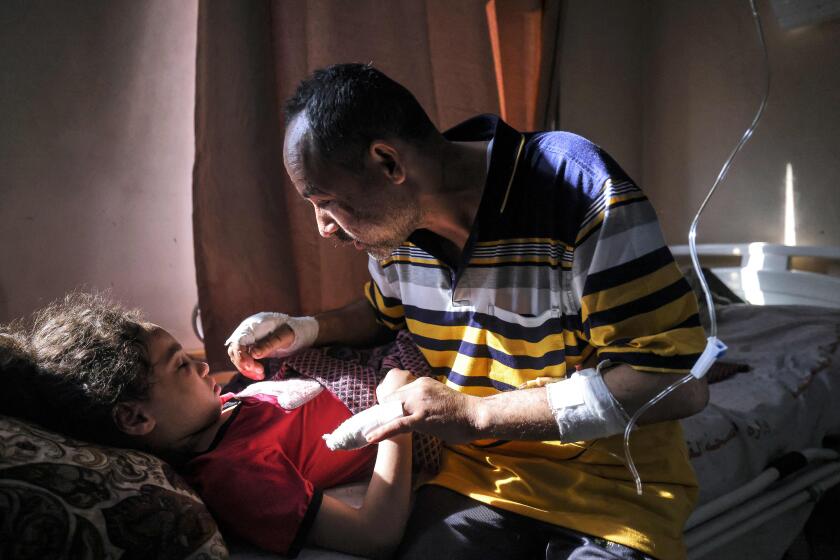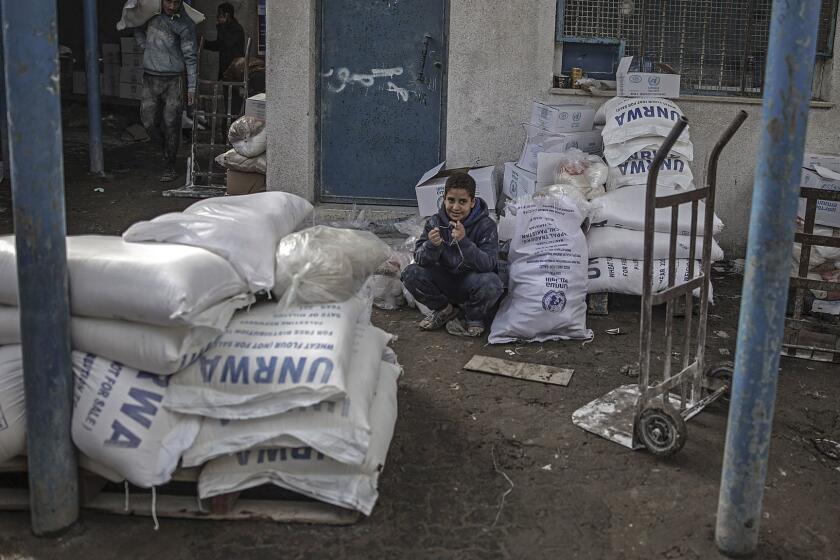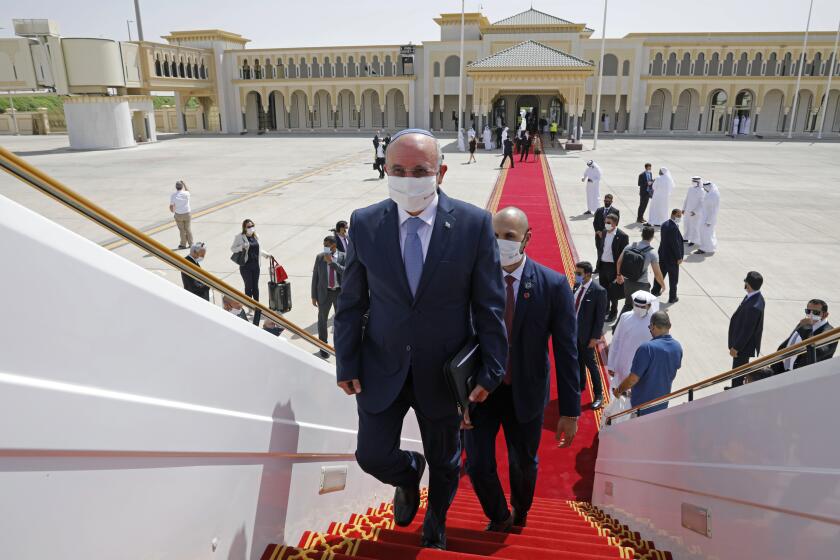Israel vows more strikes as violence escalates and deaths rise
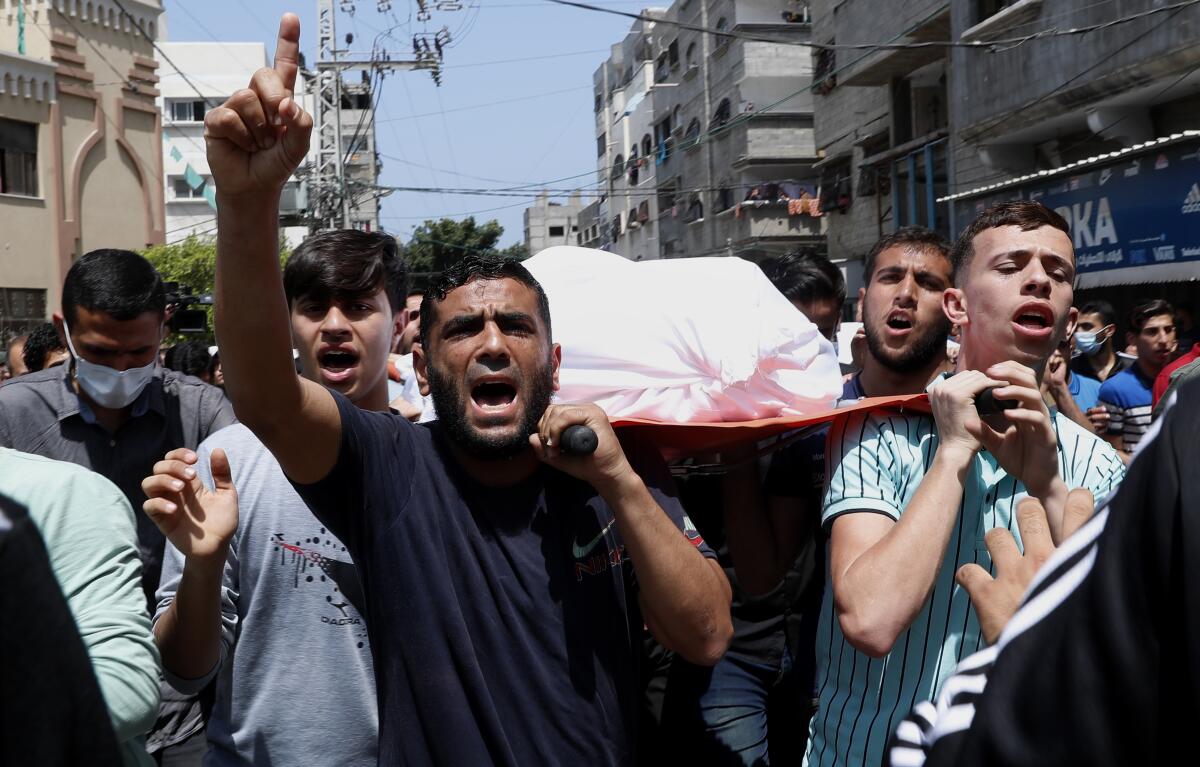
- Share via
GAZA CITY — Israel unleashed new airstrikes on Gaza early Tuesday, hitting a pair of high-rise buildings believed to be housing militants, as Hamas and other armed groups bombarded southern Israel with hundreds of rockets. The conflict escalated relentlessly throughout the day, and Israel vowed that its strikes would only increase.
The latest exchange of fire was sparked by weeks of tensions in contested Jerusalem.
Since sundown Monday, 26 Palestinians — including nine children — have been killed in Gaza, most of them by airstrikes, Gaza health officials said. The Israeli military said at least 16 of the dead were militants. During the same period, Gazan militants fired hundreds of rockets toward Israel, killing two Israeli civilians and wounding 10 others.
Israel continues its assault on the Gaza Strip as the U.S. and others call for a cease-fire.
Israeli Prime Minister Benjamin Netanyahu warned Tuesday that more was coming. He said after meeting with senior defense officials that Israel would “increase even more the strength of the strikes and also the rate of the strikes” against Hamas and Islamic Jihad militants in the Gaza Strip.
“Hamas will receive blows now that it didn’t expect,” he said in a statement.
The Israeli military said it was sending troop reinforcements to the Gaza border, and the defense minister ordered the mobilization of 5,000 reserve soldiers.
Egyptian officials said they were working on brokering a cease-fire to calm the worst outbreak of violence in years in Israel and the Palestinian territories.
Deficit and desperation define life these days in the Gaza Strip.
The barrage of rockets and airstrikes was preceded by hours of violent confrontations between Palestinians and Israeli security forces, including at Jerusalem’s Al Aqsa Mosque, which sits in a hilltop compound that is sacred to both Jews and Muslims. The current violence, like previous rounds — including the last Palestinian intifada, or uprising — has been fueled by conflicting claims over Jerusalem, which is at the emotional core of the long conflict.
In a sign of widening unrest, hundreds of residents of Arab communities across Israel staged overnight demonstrations, denouncing the recent actions of Israeli security forces against Palestinians. It was one of the largest protests by Palestinians in Israel in recent years.
Israel and Hamas, an Islamic militant group that seeks Israel’s destruction, have fought three wars and numerous skirmishes since Hamas seized control of Gaza in 2007. Recent rounds of fighting have usually ended after a few days, often helped by behind-the-scenes mediation by Qatar, Egypt and others.
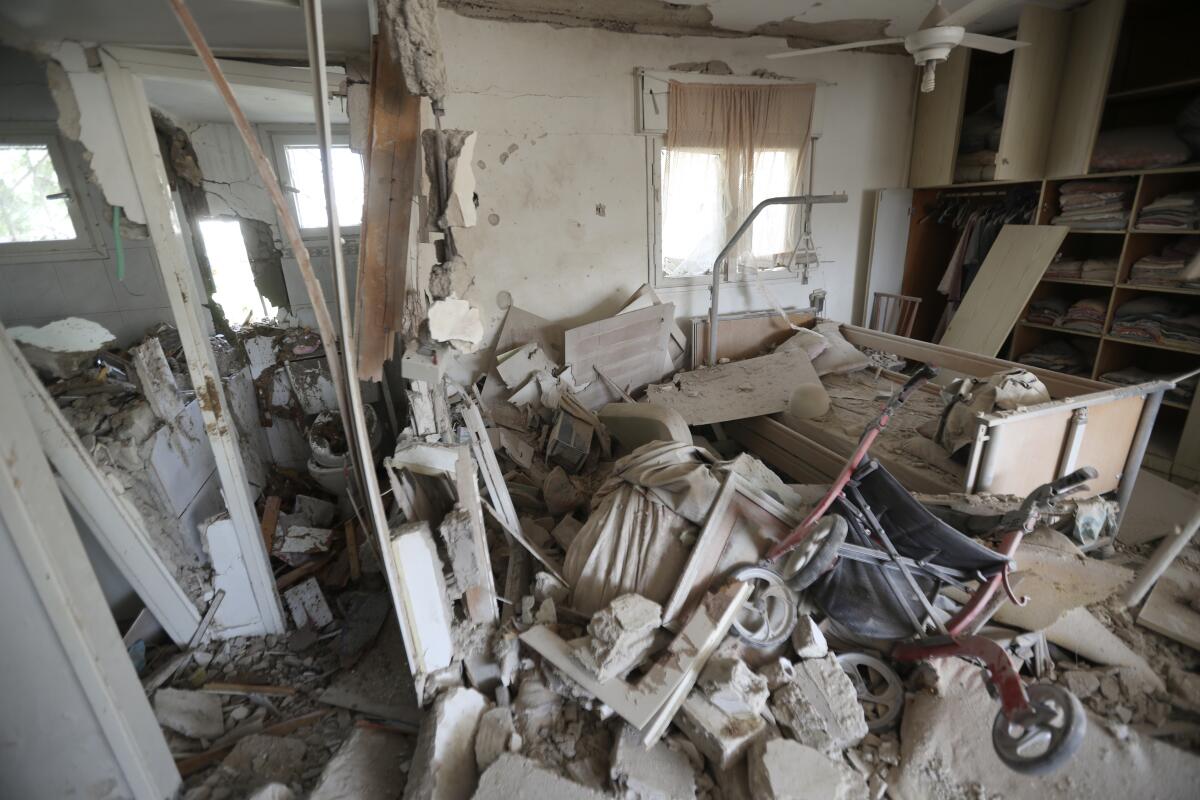
An Egyptian official confirmed that the country was trying to broker a truce. But the official, speaking on condition of anonymity because he was discussing sensitive diplomacy, said Israeli actions in Jerusalem had complicated those efforts. A Palestinian security official, also speaking on condition of anonymity, confirmed the cease-fire efforts.
Before vowing more strikes, Netanyahu had already warned that fighting could “continue for some time.” Lt. Col. Jonathan Conricus, an Israeli military spokesman, told reporters Tuesday that the military was in “the early stages” of its campaign.
Israel carried out dozens of airstrikes on Gaza, including two that targeted high-rise buildings where militants were believed to be hiding.
At midday, an airstrike hit an apartment building in central Gaza City. Local media said an unknown number of militants had been killed. The force of the blast sent terrified residents, including women and children who were barefoot, running into the streets.
Twenty-five years ago, a two-state solution seemed inevitable. Today, the world is a very different place.
An earlier airstrike hit a high-rise elsewhere in Gaza City as people were saying dawn prayers, residents said. Health officials said two men and a woman were killed. The woman’s 19-year-old disabled son was among the dead, residents said.
Ashraf Kidra, spokesman for the Gaza Health Ministry, said a total of 26 people, including nine children, were killed and 122 people were wounded. He said Israel’s “relentless assault” was overwhelming the healthcare system, which has been struggling with a coronavirus outbreak.
The escalation comes at a time of political limbo in Israel.
Netanyahu has been acting as a caretaker prime minister since an inconclusive parliamentary election in March. He tried and failed to form a coalition government with his hard-line and ultra-Orthodox allies, and the task was handed to his political rivals last week. One of those rivals is Israel’s defense minister, who is overseeing the Gaza campaign.
Despite their political antagonism, both rival camps have expressed support for striking Hamas hard.
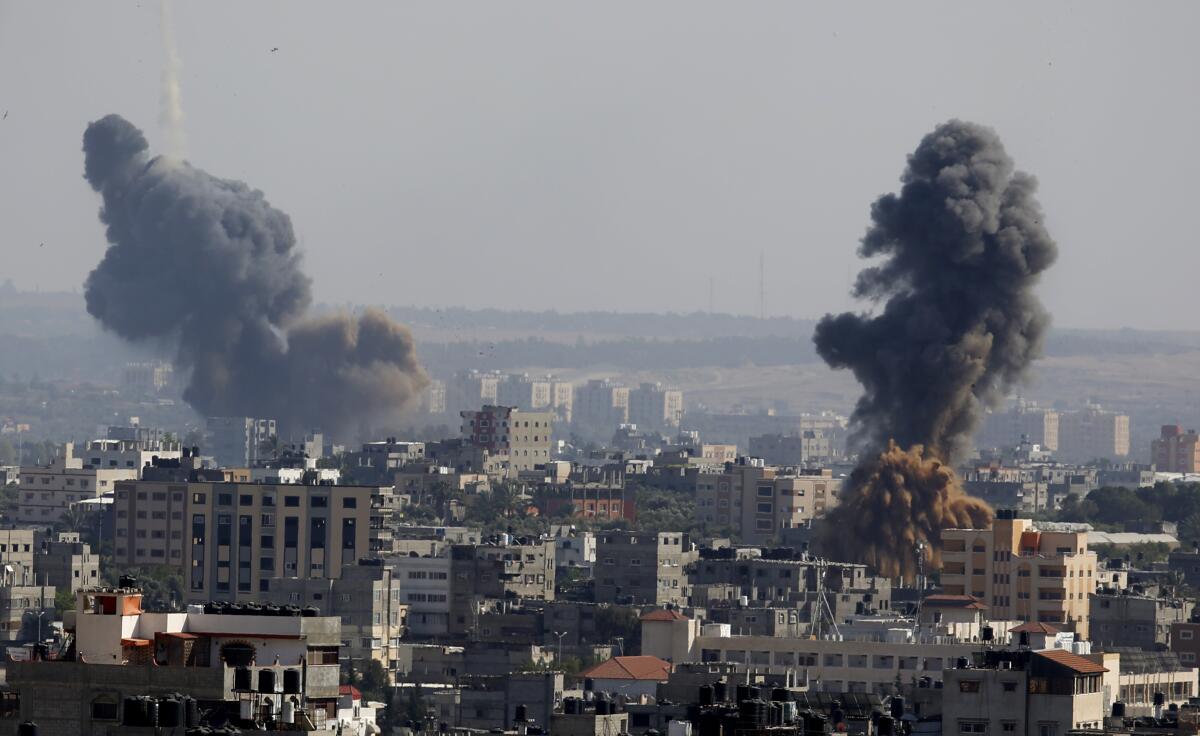
The current round of violence in Jerusalem coincided with the start of the Muslim holy month of Ramadan in mid-April.
Critics say heavy-handed Israeli police measures helped stoke nightly unrest, including a decision to temporarily seal off a popular gathering spot where Palestinian residents would meet after evening prayers. Another flashpoint was the Jerusalem neighborhood of Sheik Jarrah, where dozens of Palestinians are under threat of eviction by Jewish settlers.
Over the weekend, confrontations erupted at the Al Aqsa Mosque compound, which is the third-holiest site of Islam and the holiest site in Judaism.
Over several days, Israel police fired tear gas, stun grenades and rubber bullets at Palestinians in the compound who hurled stones and chairs. At times, police fired stun grenades into the carpeted mosque.
Arab states prefaced normalization with Israel on a deal giving Palestinians a state. But the United Arab Emirates’ and Bahrain’s moves change that.
On Monday evening, Hamas began firing rockets from Gaza, setting off air-raid sirens as far as Jerusalem. From there on, the escalation was rapid.
Conricus, the army spokesman, said Gazan militants fired more than 500 rockets at Israel. The barrage was so intense that Israel’s Iron Dome rocket-defense system appeared to be overwhelmed. At midday Tuesday, some 10 rockets whizzed above the southern city of Ashdod, filling the skies with streaks of white smoke.
The army said a rocket made a direct hit on a seven-story apartment block in the coastal Israeli city of Ashkelon. Israeli paramedic service Magen David Adom said it treated six people injured in the rocket strike. Two were hospitalized in moderate condition.
Later, a second building in the city of Ashdod was hit, lightly wounding four people, Israeli police said.
News Alerts
Get breaking news, investigations, analysis and more signature journalism from the Los Angeles Times in your inbox.
You may occasionally receive promotional content from the Los Angeles Times.
Conricus said the military hit 130 targets in Gaza, including two tunnels that militants were allegedly digging under the border with Israel. He said Israel’s new system of concrete barriers and electronic sensors, intended to thwart tunnel digging, had proved effective.
He did not address Gaza Health Ministry reports about the dead children. The ministry said more than 100 Gazans were wounded in the Israeli airstrikes.
Seven of the dead in Gaza were members of a single family, including three children, who died in an explosion in the northern Gaza town of Beit Hanoun. It was not clear, however, if the blast was caused by an Israeli airstrike or an errant rocket.
Israel’s tactics in Jerusalem have drawn angry reactions from the Muslim world.
Regional powerhouse Saudi Arabia on Monday condemned in the strongest terms what it said were attacks by Israeli forces against the sanctity of Al Aqsa and the safety of its worshipers. The Saudi Foreign Ministry called on the international community Tuesday to hold Israeli forces responsible for any escalation.
More to Read
Sign up for Essential California
The most important California stories and recommendations in your inbox every morning.
You may occasionally receive promotional content from the Los Angeles Times.
